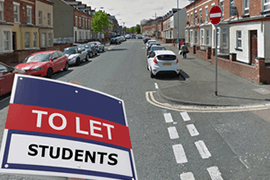Electrical Safety Tips For Students
Electrical Safety Tips For Students
With the new term starting soon, students will be searching for their new accommodation for the year. Recent figures show that student numbers are on the rise with more adolescents starting university each year. This can be both an exciting and overwhelming time and for most of you, it will be your first time living away from home. Approximately 70% of student accommodation is privately owned meaning that proper safety protocols may not always be in place.
With the new term starting soon, students will be searching for their new accommodation for the year. Recent figures show that student numbers are on the rise with more adolescents starting university each year. This can be both an exciting and overwhelming time and for most of you, it will be your first time living away from home. Approximately 70% of student accommodation is privately owned meaning that proper safety protocols may not always be in place.
Meteor’s tips below can help ensure that you are prepared for various electrical/fire hazards in your new home. They also explain what to look out for, because identifying the hazard on time can help prevent any risk in the future.
What to DO
- Prior to your arrival try to ensure that your landlord hasn’t previously overloaded any sockets. This could cause overheating, leaving your new home at risk of a fire. When you first move in, check all appliances which have been supplied with the premises. Things to look out for include cuts or abrasions to the cable, non-standard plugs, loose parts or screws and signs of overheating or burning.
- Make sure that your property is fitted with a working smoke and carbon monoxide alarm. Upon arrival test each of them to rule out any faults. Repeat this at regular intervals throughout the year.
- Make sure that you or your housemates do not store anything on top of your microwave as they can cause it to overheat.
What NOT to do
- Don’t carry out any electrical work in the property yourself, even if your landlord asks you to. Fixing electrical problems is the landlord’s responsibility and they should employ a registered electrician to undertake all electrical work.
- Don’t try to be a Gordon Ramsey when you are drunk. After a night out, nothing seems more appealing than putting on something to soak up the alcohol. Be smart, get a chippy. Your usual safety-conscious brain is likely to have been numbed with alcohol and your response rate will be a lot slower. This means you are more at risk of leaving ovens and hobs unattended as well as suffering burns.
- Do not purchase substandard or counterfeit chargers. There has been an increase in the number of incidents being reported about faulty electrical goods, particularly fake, cheap and unbranded chargers. Many of these items fail to meet UK safety regulations and can lead to electric shocks, injuries and can even initiate fires. These items can be very dangerous particularly if they are leave left on for long periods of time e.g. over night
And remember:
- Keep an eye out for constant tripping of fuses, flickering lights and scorching/markings around sockets. These are common signs that something is at fault.
- If your property uses gas, your landlord is legally required to provide you with a gas safety certificate. Make sure you see a copy upon arrival.

